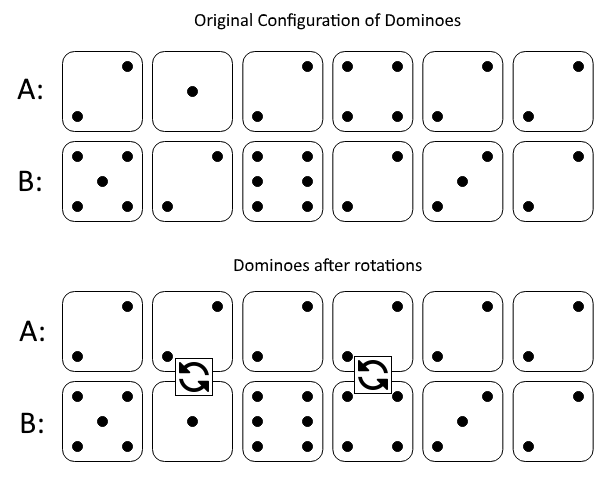In a row of dominoes, tops[i] and bottoms[i] represent the top and bottom halves of the ith domino. (A domino is a tile with two numbers from 1 to 6 - one on each half of the tile.)
We may rotate the ith domino, so that tops[i] and bottoms[i] swap values.
Return the minimum number of rotations so that all the values in tops are the same, or all the values in bottoms are the same.
If it cannot be done, return -1.
Example 1:
Input: tops = [2,1,2,4,2,2], bottoms = [5,2,6,2,3,2] Output: 2 Explanation: The first figure represents the dominoes as given by tops and bottoms: before we do any rotations. If we rotate the second and fourth dominoes, we can make every value in the top row equal to 2, as indicated by the second figure.
Example 2:
Input: tops = [3,5,1,2,3], bottoms = [3,6,3,3,4] Output: -1 Explanation: In this case, it is not possible to rotate the dominoes to make one row of values equal.
Constraints:
2 <= tops.length <= 2 * 104bottoms.length == tops.length1 <= tops[i], bottoms[i] <= 6
Solution 1: Greedy
According to the problem description, we know that in order to make all values in
Therefore, we design a function
The calculation method of function
We use two variables
The time complexity is
class Solution:
def minDominoRotations(self, tops: List[int], bottoms: List[int]) -> int:
def f(x: int) -> int:
cnt1 = cnt2 = 0
for a, b in zip(tops, bottoms):
if x not in (a, b):
return inf
cnt1 += a == x
cnt2 += b == x
return len(tops) - max(cnt1, cnt2)
ans = min(f(tops[0]), f(bottoms[0]))
return -1 if ans == inf else ansclass Solution {
private int n;
private int[] tops;
private int[] bottoms;
public int minDominoRotations(int[] tops, int[] bottoms) {
n = tops.length;
this.tops = tops;
this.bottoms = bottoms;
int ans = Math.min(f(tops[0]), f(bottoms[0]));
return ans > n ? -1 : ans;
}
private int f(int x) {
int cnt1 = 0, cnt2 = 0;
for (int i = 0; i < n; ++i) {
if (tops[i] != x && bottoms[i] != x) {
return n + 1;
}
cnt1 += tops[i] == x ? 1 : 0;
cnt2 += bottoms[i] == x ? 1 : 0;
}
return n - Math.max(cnt1, cnt2);
}
}class Solution {
public:
int minDominoRotations(vector<int>& tops, vector<int>& bottoms) {
int n = tops.size();
auto f = [&](int x) {
int cnt1 = 0, cnt2 = 0;
for (int i = 0; i < n; ++i) {
if (tops[i] != x && bottoms[i] != x) {
return n + 1;
}
cnt1 += tops[i] == x;
cnt2 += bottoms[i] == x;
}
return n - max(cnt1, cnt2);
};
int ans = min(f(tops[0]), f(bottoms[0]));
return ans > n ? -1 : ans;
}
};func minDominoRotations(tops []int, bottoms []int) int {
n := len(tops)
f := func(x int) int {
cnt1, cnt2 := 0, 0
for i, a := range tops {
b := bottoms[i]
if a != x && b != x {
return n + 1
}
if a == x {
cnt1++
}
if b == x {
cnt2++
}
}
return n - max(cnt1, cnt2)
}
ans := min(f(tops[0]), f(bottoms[0]))
if ans > n {
return -1
}
return ans
}
func max(a, b int) int {
if a > b {
return a
}
return b
}
func min(a, b int) int {
if a < b {
return a
}
return b
}function minDominoRotations(tops: number[], bottoms: number[]): number {
const n = tops.length;
const f = (x: number): number => {
let [cnt1, cnt2] = [0, 0];
for (let i = 0; i < n; ++i) {
if (tops[i] !== x && bottoms[i] !== x) {
return n + 1;
}
cnt1 += tops[i] === x ? 1 : 0;
cnt2 += bottoms[i] === x ? 1 : 0;
}
return n - Math.max(cnt1, cnt2);
};
const ans = Math.min(f(tops[0]), f(bottoms[0]));
return ans > n ? -1 : ans;
}
